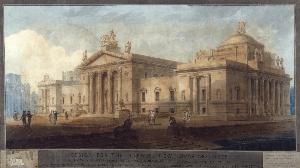John Soane Ra
John Soane;John Soane Ra
สถานที่: London
เกิด: 1753
ความตาย: 1837
ชีวประวัติ:
John Soane Ra, a prominent British architect, was born on September 10, 1753, in Goring-on-Thames, and passed away on January 20, 1837. He is renowned for his work in the Neo-Classical style, which had a significant impact on the development of architecture in the United Kingdom.
Early Life and Education
Soane's father was a bricklayer, and he rose to the top of his profession through his own efforts. He began his training as an architect at the age of 15 under George Dance the Younger and later joined the household and office of Henry Holland. Soane attended the Royal Academy schools, where he received a silver medal for his measured drawing of the façade of the Banqueting House, Whitehall, and a gold medal for his design of a Triumphal Bridge.
Notable Works
Soane's best-known work is the Bank of England, which had a widespread effect on commercial architecture. He also designed the Dulwich Picture Gallery, which, with its top-lit galleries, was a major influence on the planning of subsequent art galleries and museums. The Sir John Soane's Museum in Lincoln's Inn Fields is another notable example of his work, showcasing his collection of art works and architectural artefacts.
Awards and Recognition
Soane received a knighthood in 1831 for his contributions to architecture. He was also elected as a professor of architecture at the Royal Academy and served as an official architect to the Office of Works. Key aspects of Soane's work:
- Neo-Classical style
- Influence on commercial architecture
- Design of art galleries and museums
- Collection of art works and architectural artefacts
Legacy
Soane's legacy can be seen in his designs, which have had a lasting impact on the development of architecture in the United Kingdom. His work can be explored further through the paintings and biographical information available on Wikioo.org and Wikipedia. John Soane Ra is an important figure in the history of British architecture, and his work continues to inspire architects and art enthusiasts today. The Royal Academy of Arts and the Sir John Soane's Museum are must-visit destinations for those interested in exploring his designs and legacy.

